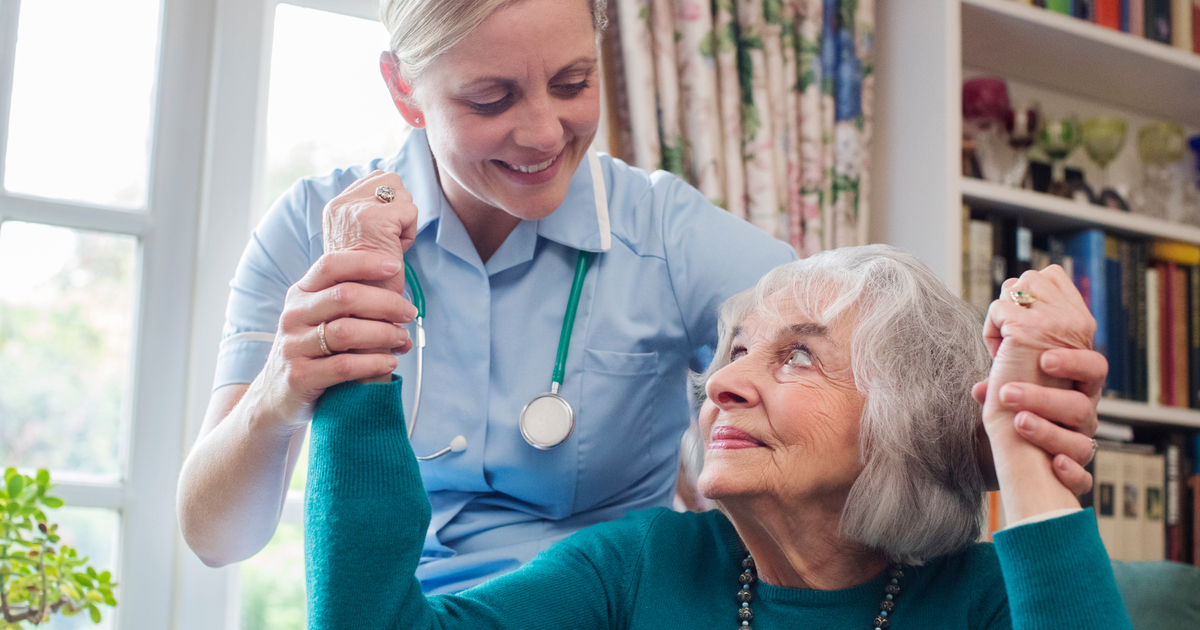Ranking right up there with losing their freedom and independence, one of the biggest fears that aging in place older Americans face is suffering a stroke. Thousands of seniors suffer strokes every year, making it the leading cause of permanent disabilities in the elderly population.
If you’re currently caring for an aging loved one who’s had a stroke, keeping them comfortable and healthy can be quite challenging. On the bright side, providing them with the nurturing care they need is possible when you use these tips from the pros.
Why Do Strokes Happen?
A stroke occurs when a person’s brain is deprived of the vital oxygen it needs because of a leaky or broken blood vessel, or blocked artery. Once that oxygen deprivation takes place brain cells start to die. Because those brain cells control various functions in the human body, the stroke victim then starts to experience outward physical signs related to their motor skills and senses. Oftentimes, the resulting damage is permanent.
Strokes Cause these Disabilities
Because most stroke victims never fully recover, living with a disability becomes the “new normal”. Those permanent disabilities may include:
- Trouble speaking or understanding speech
- Partial vision loss
- Paralysis to an arm, leg or entire side of the body
- Swallowing difficulties
- Diminished strength
As a caregiver, you’ll need to find ways to help your loved one cope with their lifestyle limitations so they can continue aging comfortably at home. While they’re still recovering in the hospital is a good time to get started on your planning and preparation.
Devising a Good Stroke After-Care Program
Caring for an at-home senior who’s recovering from a stroke takes a multi-faceted approach that focuses on these areas:
Rehabilitation and Therapy
Your senior will probably need some weekly speech or physical therapy to help them regain at least some use of paralyzed body parts, and to teach them how to live with their disability. Studies have found that the faster rehabilitation begins, the greater the odds that a stroke victim will recover completely. Assist your loved one by checking into possible therapy providers, helping them coordinate insurance benefits, and by getting them to therapy appointments.
Safe Proof Their Home
For stroke victims, the home can be a dangerous place. A wheelchair ramp leading up to the front door may be necessary, and their bathroom modified with grab bars, better lighting, a raised toilet and shower seat. Remove all trip hazards from the home’s rooms and walkways, and ensure that the steps and stairs are all brightly lit. It’s also wise to install anti-scalding water temperature-restricting devices on the kitchen and bathroom faucets.
Provide Reassurance
Seniors that have suffered a stroke oftentimes struggle with anxiety and depression. While around your loved one, constantly reassure them that they will get the best care and support possible, and that you will be at their side as the recovery continues. If they are a family member, encourage other family members to visit and support them. Accompany your loved one to as many doctor’s appointments and therapy sessions as possible, and help them find a stroke-recovery support group.
Lifestyle Changes
Based on statistics, over one-fourth of all stroke survivors are at risk to experience another one within five years. Positive lifestyle changes may help lower that risk, so encourage them to:
- Control their blood sugar and blood pressure
- Give up cigarette smoking and alcohol
- Eat a healthier diet rich in fresh fruit, fresh veggies and lean proteins
- Exercise 30 minutes per day
- Socialize with others
- Lose weight if they’re obese
When caring for a stroke victim, it’s also important that you take care of yourself. That means eating right, exercising, sleeping enough, not abusing drugs or alcohol, and taking caregiving breaks occasionally to recharge.
We’re an Extended Family in Your Loved One’s Home
Caring for an elderly stroke victim is highly rewarding, but it can also be stressful and exhausting. When you need to recharge, call on a respite caregiver from Seniors Prefer Homecare. Whether it’s a few hours per week, or 24 hours a day, our well trained and carefully screened caregivers will serve as an extended family in your loved one’s home so they can keep aging comfortably in place right where they want to be.
Our fully licensed and insured home care services include light housekeeping, personal hygiene, meals, medication reminders, transportation and companionship. And, all our reliable services can be individually tailored in an affordable package that’ll restore your peace-of-mind. To learn more about Seniors Prefer Homecare, or to schedule a FREE, in-home consultation for a senior in Tuscaloosa or Huntsville, AL, visit: www.seniorspreferhomecare.com now!

